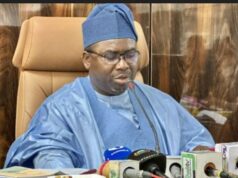
Each morning, Aisha Muhammadu Buhari, wife of the President of Nigeria wakes up with a picture of women and children struggling through challenges of hunger and sickness, having to choose between food and medication. Sometimes they lose both, even as they battle the lack of education and harmful cultural practices. More often than not, they suffer permanent wounds and scars of these challenges, at other times, succumbing to the cold hands of death.
Each time, she would flash options in her mind; what to do, how to do it, who to do it with – all in a bid to ensure that one more life is saved, one more prospective contributor to national development. Is it easier to give women education or to empower them with self-reliance? How much impact can one make?
She has keyed into the RMNCAH+N Policy, (Reproductive, Maternal, Neonatal, Child and Adolescent Health and Nutrition) through her Future Assured Programme and has already made a lot of impact through advocacy campaigns on breastfeeding, de-worming, killer diseases, complementing this with food, nutrition and medicinal aid, calling on government and privileged Nigerians to save more lives of women and children.
At a recent event she organized for the private sector, she spoke on the need for them to embrace RMNCAH+N as their Corporate Social Responsibility and advocated for Innovative partnerships for investment in the sector. She presented a portfolio of areas of support for them to choose from. Captains of industry attended, listened and keyed in. Most importantly, they understood the precarious lives that women and children go through because of lack of access to essential health services.
Every year in Nigeria, 58,000 women are said to die from pregnancy related complications; from excessive bleeding after child birth, to complications of hypertension in pregnancy, unsafe abortions, infections and obstructed labour. At the event, Mrs. Buhari stressed that interventions to save the lives of these women are low cost, but of high impact because with only N58,381 it is possible to save one pregnant woman from dying in the process of giving birth to another life. She requested private sector to join her in saving at least 5% of these each year over the next 5 years.
Also important, 839,500 children do not make it to their 5th birthday because of malaria, pneumonia, diarrhea, measles, HIV and malnutrition. N28,454 is required to save each of these children so that they can live their lives. Some of the interventions include simple prevention and treatment, case management, therapeutic foods, fortifications and the like, some as simple as zinc, vitamin A and folic acid. In fact, it has been established that folic acid taken before conception and in the first few months of pregnancy can prevent spina bifida and associated complications.
Deficiency of these drugs causes problems for both the mother and the unborn child, Sometimes these deficiencies are attributed to poverty and illiteracy rather than lack of the drugs at the ante-natal clinics. A lot of mothers get to know the dangers only too late. Some of them, after suffering from a traumatic pregnancy and even child birth, now have to contend with a perpetually sick child, whose ailment can only be treated at a huge cost. Most of the support in this area is therefore slow and low.
This is why Mrs. Buhari has come in and supported the surgeries of eight children aged from a few months to 6 years. The surgeries were principally in three areas; Hydrocephalus, Encephalocele and Myelomeningocele.
Hydrocephalus results from complications of premature birth, diseases such as meningitis, tumors and traumatic head injury. It is typified by accumulation of cerebrospinal fluid (CSF) within the brain. This fluid compresses the brain, causing neurological symptoms such as convulsions, intellectual disability and epileptic seizures. Fetuses, infants, and young children with hydrocephalus typically have an abnormally large head, excluding the face, because the pressure of the fluid causes the individual skull bones — which have yet to fuse — to bulge outward at their juncture points.
Encephaloceles causes a groove down the middle of the skull, or between the forehead and nose, or on the back side of the skull. Symptoms may include neurologic problems, cerebrospinal fluid accumulated in the brain, paralysis of the limbs, an abnormally small head, uncoordinated muscle movement, developmental delay, vision problems, mental and growth retardation, and seizures.
Myelomeningocele is the type of spina bifida that often results in the most severe complications. In individuals with myelomeningocele, the un-fused portion of the spinal column allows the spinal cord to protrude through an opening. The membranes that cover the spinal cord also protrude through the opening, forming a sac enclosing the spinal elements, such cerebrospinal fluid, and parts of the spinal cord and nerve roots.
These children have undergone successful surgeries so far, while others are receiving attention. Ya’u Usman, male, 9 months old had Hydrocephalus; Ma’aruf Abdulsalam, male, 3 months had Hydrocephalus and Myelomeningocele; Muhammad Auwal, male, 1 year old had Encephalocele. Nana Khadija Adamu, female, 1 year old, had Hydrocephalus and Myelomeningocele; Asmau Sabiu, female, 6 years old, had brain tumour and Hydrocephalus.
Mrs. Buhari’s acts of compassion continues to show the way for others to emulate. If the private sector can sponsor one hundred or one thousand lives of women and children, then our collective humanity has been proven, our women and children will have a chance be full and not temporary members of our national reality.
Haruna, Director of Information to the wife of the President, wrote in from Abuja. [myad]






